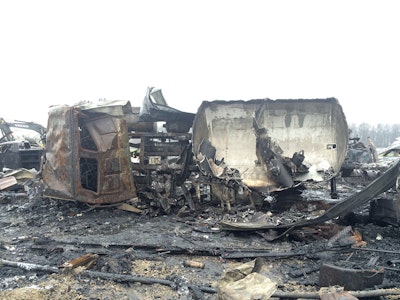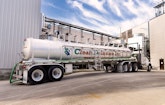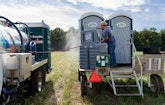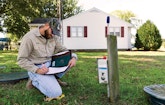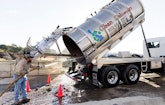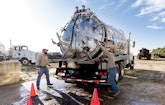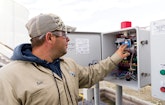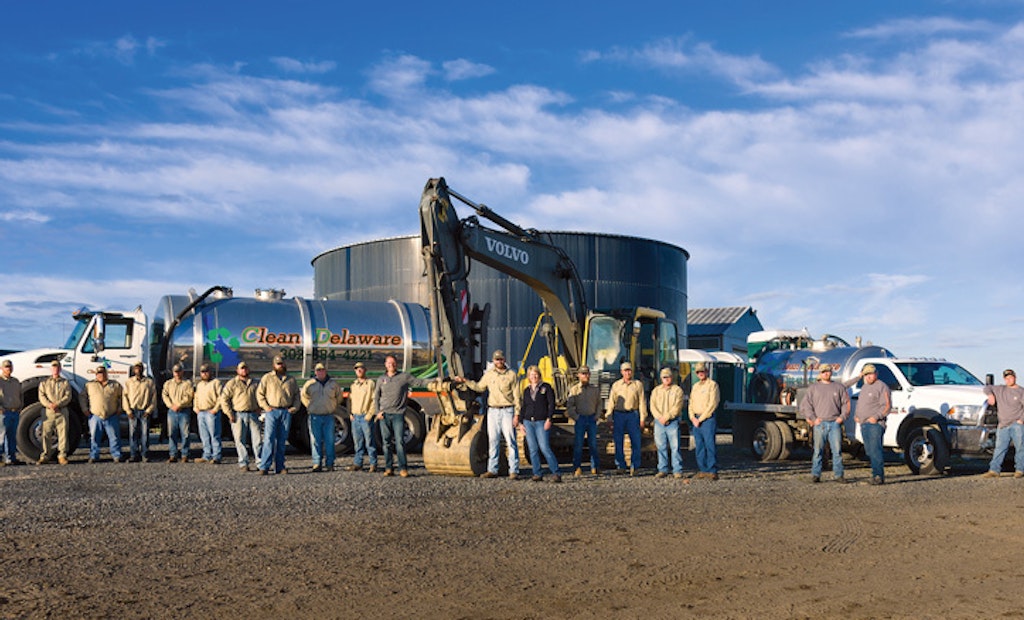
Interested in Trucks?
Get Trucks articles, news and videos right in your inbox! Sign up now.
Trucks + Get AlertsGerry Desmond recalls exactly where he left a shipment of decals designated for portable restrooms the night of a fire that ravaged the premises of Clean Delaware in Milton, Delaware.
“We’d received enough decals to cover 100 portable restrooms,” says Desmond, the company’s general manager. “I left them on the seat of one of the trucks Thursday night. That’s the last time I saw the shop before it was destroyed.”
Desmond believes the fire started shortly after 6 a.m. on Jan. 9, 2015. “One of my employees who lives nearby called me to say that there was a fire,” he says. “On the way over I heard a giant ‘whuff’ and saw a fireball 200 feet tall — that was the propane tank exploding.”
Nine fire companies battled the blaze and brought it under control by 9:30 a.m. The fire had consumed the entire shop, 11 vacuum trucks parked inside and 175 portable restrooms located around the propane tank. Also gone: pumps, timers, controls, fittings and other inventory. The company’s onsite wastewater treatment plant was also significantly damaged.
RESTORING SERVICE
“After the fire, all that was left of a Kenworth truck with a 5,000-gallon aluminum tank was an engine block and frame — not even a steering wheel,” Desmond recalls. “Some of the guys tried to recover their favorite hooks from the ashes, but few succeeded.”
The folks at Clean Delaware made a decision to survive that day.
Launched in 1984, the business has prospered serving Sussex and Kent counties, and now employs 30 people. The company divides its time between three primary pursuits:
- Commercial and municipal pumping represents 60 percent of business. Clients include agricultural operations and food processing plants, breweries and municipalities requiring removal of biosolids and treated sludge.
- Septic tank pumping, installation and repair represents 25 percent of the work. About half the installations are advanced treatment systems with associated operations and maintenance contracts required by state law.
- Portable sanitation service for 800 restrooms represents the remainder of the work.
Clean Delaware was first profiled in Pumper 10 years ago as a pumping company celebrating its 25th anniversary. The magazine returned to check out how a small business comes back after a devastating fire.
KEEP CREWS BUSY
Desmond’s two immediate priorities in the aftermath of the devastation: keeping his workers busy and servicing as many customers as possible. While the local office was destroyed, the company’s head office is located offsite and provided continuity.
“A lot of our crew has been with us 10 years or more,” says Desmond. “There were more than a few tears as they wondered if they had jobs to go back to. We immediately began to find things for them to do, like taking stock of surviving equipment.”
Only two vacuum trucks parked away from the shop survived: a 2007 Kenworth T800 pulling a 7,000-gallon aluminum tank trailer by Polar with a Masport pump, and a 1991 Freightliner FLD120 pulling a 5,500-gallon stainless steel tank trailer from Presvac Systems.
“That was good news because we still had some pumping capacity,” says Desmond. “The bad news was that it’s not easy to drive a tractor trailer to a customer’s house to pump their septic system. But the most important thing was to keep our people working.”
Desmond secured an office trailer and ordered electrical and telephone hookups and a new coffee machine.
A local news outlet reported that the operation had closed for good. Clean Delaware called regular customers to assure them that the company was indeed open for business — that day and for the long haul.
TO THE RESCUE
Desmond set to work finding additional service trucks to rent, purchase or borrow. Friends and competitors provided assistance for all three, often spontaneously.
“One competitor offered to run some of our restroom routes for us,” says Desmond. “RPJ Waste Services had a portable restroom service truck that they had recently taken off the road, an Isuzu with a 900-gallon combined capacity tank. They serviced it to get it roadworthy and told us it was ours as long as we wanted it. Eastern Lift Truck Company off-loaded a forklift in our yard and told us it was ours as long as we needed it. We received a lot of unsolicited kindness.”
Vacuum Sales in Lindenwold, New Jersey, also rushed a trade-in truck off the lot, which was ready to use by Friday evening.
“We called our operator network to find out if there were any new pumpers available,” says Desmond. “Lane’s Mobile John in Kentucky had three Dodge 5500s coming off the line. Generally nobody sells you a truck without a two- to three-month lead time, but we flew three guys out to Kentucky and they drove them back.”
The company had also been interested in buying the assets of another pumping company — the deal was closed in a day. Desmond recalls painting the company logo onto that truck.
“That really boosted morale,” he says. “We had our identity back.”
DOING MORE WITH LESS
While Clean Delaware’s pumper fleet featured tanks with an average 4,200-gallon capacity, the replacement fleet initially averaged closer to 2,000 gallons, requiring the crew to drive longer hours to cover the same ground.
“We had a brutally cold winter, so with pumpers parked outside instead of inside, we were dealing with frozen valves and lines,” says Desmond. “Everything took longer. It was a perfect storm of bad events.”
The cause of the fire was never determined. However, a replacement 60- by 90-foot building was erected by November. Insurance fully covered the replacement costs of the building, although vehicles were compensated at depreciated value, requiring Clean Delaware to commit additional capital to replace vehicles. While major inventory over $2,000 was covered for insurance purposes, Desmond notes that replacing smaller tools remains an ongoing effort.
“Not a week goes by without someone asking where they can find the ‘doohickey’ machine,” he says.
Today, the fleet is fully built out. The company’s six commercial vacuum trucks include three Internationals — a 2001 8100 with a 3,300-gallon steel tank and Jurop/Chandler pump; a 2003 4900 with a 3,600-gallon Progress aluminum tank and Wittig pump (Gardner Denver); and a 2013 7600 with 4,800-gallon Progress aluminum tank and Masport pump. The remaining trucks all have pumps by National Vacuum Equipment: a 1999 Sterling with 3,400-gallon steel tank; a 2014 Kenworth T440 with 4,200-gallon Presvac aluminum tank; a 2014 Freightliner M2 106 with 4,000-gallon Amthor International aluminum tank; and a 2015 Western Star 4700 with 4,000-gallon aluminum Amthor tank.
A Lakeside Raptor septage acceptance plant assists in processing waste for the company’s on-site waste processing facility.
The portable sanitation fleet includes five trucks, all with Masport pumps: three Dodge 550s with 950-gallon waste/300-gallon freshwater tanks, two steel and one aluminum, from Lane’s Vacuum Tank; and two Isuzu NRR trucks from Crescent Tank with 750-gallon waste/350-gallon freshwater steel tanks that carry six portable restrooms.
Of five shop trucks, four have utility bodies — two 2013 Ford F-450s with lifts and two 2016 Chevy 3500s. The fifth is a 1996 Chevy 3500 flatbed with stake body that can carry six portable restrooms.
Two dump trucks are used in septic tank installations: a 2006 Kenworth with Morgan dump body and a 2000 Sterling. Four excavators include two Kubotas, a Volvo and a Takeuchi.
BACK ON OUR FEET
“Before the fire, we had tried to move the truck fleet toward a single manufacturer because we thought that it might be easier for in-house maintenance and stocking replacement parts,” says Desmond. “We now have a menagerie of trucks from a range of manufacturers and I can honestly say that it doesn’t appear to make much of a difference.”
He notes that the company may have lost five or six portable restroom contracts in the first weeks following the fire.
“Ironically, the publicity resulting from the fire probably made up the business with new customers,” says Desmond. “While I wouldn’t wish a fire on anyone, it helped us to focus on defining and rebuilding the core of our business. Almost two years after the fire, we’re in a better position than before the fire. We’re a more focused and efficient company.”
Turning a profit with restrooms
Clean Delaware operates a thriving portable restroom business.
The company fields almost 800 units: 500 K2s from Five Peaks, and 250 Fleets and 30 Comfort XL from PolyJohn Enterprises. They’re primarily delivered on a 12-unit trailer from Liquid Waste Industries. Two event trailers are from Black Tie Products — two-stall units, one ADA compliant. Deodorants are from Walex.
“Construction provides the bulk of our contracts,” says Gerry Desmond, general manager. “We’ve got a nice construction boom going in Delaware.”
The company once sought out contracts to service the largest events in the state, including the Punkin Chunkin World Championship, a pumpkin-throwing event held in Millsboro, which drew almost 50,000 people and required 200 restrooms.
“We found that on larger events like these, we were seeing damage to our units — portables with burn marks, tipped over and run over by trucks,” says Desmond. “After crunching the numbers, and discounting repairs and maintenance, we realized that we weren’t netting enough money from these events. We decided we would be better off focusing on smaller, controlled events and supplying nicer units. Today, we love doing events like farm festivals or road races where we can put out fewer but nicer units, maybe 20 to 40 with sinks and freshwater supplied with foot-activated pumps. For us, that’s the sweet spot.”
